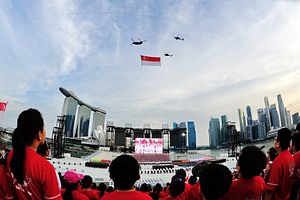After a tense round of public speeches at the Shangri-La Dialogue last weekend, followed by further rhetoric from Japan and Vietnam early this week, some of the countries involved are starting to voice a more conciliatory tone. While the most belligerent parties at the conference, Japan, China and the U.S., have yet to make any overt attempts to ease the tensions evoked, smaller states with a vested interest in regional stability are making their displeasure public.
Singapore’s Defense Minister Ng Eng Hen gave a public interview on Tuesday in which he displayed the host country’s displeasure at the potential damage to trade that the heightened security situation may create. His comments encompassed several aspects of the dispute, and Singapore’s role in regional security.
To begin with, he emphasized the link between security and trade. “It’s completely artificial to think that there are somehow firewalls between trade and security. We shouldn’t from a security point of view be dominating headlines every few days… At some point it may impact trade and our real economies,” Ng said, according to Bloomberg. He acknowledged China’s rising influence in the region, and said that it was important that the country clearly articulate its position, while emphasizing that dialogue was essential.
While he stated that ASEAN and China needed to work more diligently toward developing a code of conduct, Ng also said that addressing some aspects individually might work best considering the difficult issue of sovereignty. “It’s easier to break it down into smaller pieces and not expect some magic contrivance that suddenly removes all disputes and removes all historical baggage. That’s just completely unrealistic.”
The defense minister also addressed the issue of Singapore’s defense budget, which increased roughly with inflation from S$8.6 billion in 2004 to S$12.2 billion in 2013. He said the increases were meant to keep the military free from disruptions involved in budgetary fluctuations. He finished by saying that the region’s problems did not need to be intractable, and with so much potential, “the question I suppose to ask is, what are we fighting about?”
While Singapore has so far been the regional state most adamant in calling for restraint, both China and Japan have attempted to find common ground on issues that do not directly affect their disagreements over sovereignty. The Asahi Shimbun reported on Tuesday that governmental exchanges between the two countries’ environmental and economic authorities had resumed. The article stated that they had “recently begun work toward reopening the Japan-China Energy Conservation Forum to discuss energy and environmental cooperation.”
Additionally, before last weekend when Prime Minister Shinzo Abe’s prepared remarks started the current round of regional backbiting, Japan reiterated its call for a military hotline between itself and China. Jane’s quoted Japanese Defense Minister Itsunori Onodera as saying “It’s important to construct a maritime communication mechanism between Japan and China,” after military aircraft had come within a dozen meters of hitting each other over the East China Sea. Onodera had previously called for a hotline in January, shortly after Abe’s visit to the controversial Yasukuni Shrine in Tokyo, saying it was necessary for dialogue.
While as yet there are few signs that tensions are receding, there are other small gestures that Japan has made that could be interpreted as attempts to diffuse the situation. While Vietnam on Sunday sought to play up the delivery of Japanese coast guard ships by the end of the year, Abe had already told the Diet that Japan would be unable to immediately provide patrol ships. And despite Vietnam’s increasing belligerence toward China, Japan has also suspended much needed infrastructure loans to Vietnam Railway over a payoff scandal worth less than $1 million.
Most countries involved in the maritime disputes in the East China Sea and South China are reluctant to further heighten tension in the region. The economic impact of a legitimate conflict is nearly impossible to calculate, yet the inclusion of the world’s second or third largest economies (or both) would necessarily have worldwide economic repercussions. With the cooling of the Chinese real estate market, impending economic reforms in Japan, the ongoing economic effects of Thailand’s coup, and the generally developing nature of most Southeast Asian economies, none of the states involved are in a position to benefit from the outbreak of hostilities. While that may be a neo-liberal analysis of current events, neither of the two major players in the region (China and Japan) is in danger of a strategic threat to their sovereignty. So long as these disputes are centered on tiny islands far removed from their more strategic boundaries, the risk of actual conflict remains muted.

































